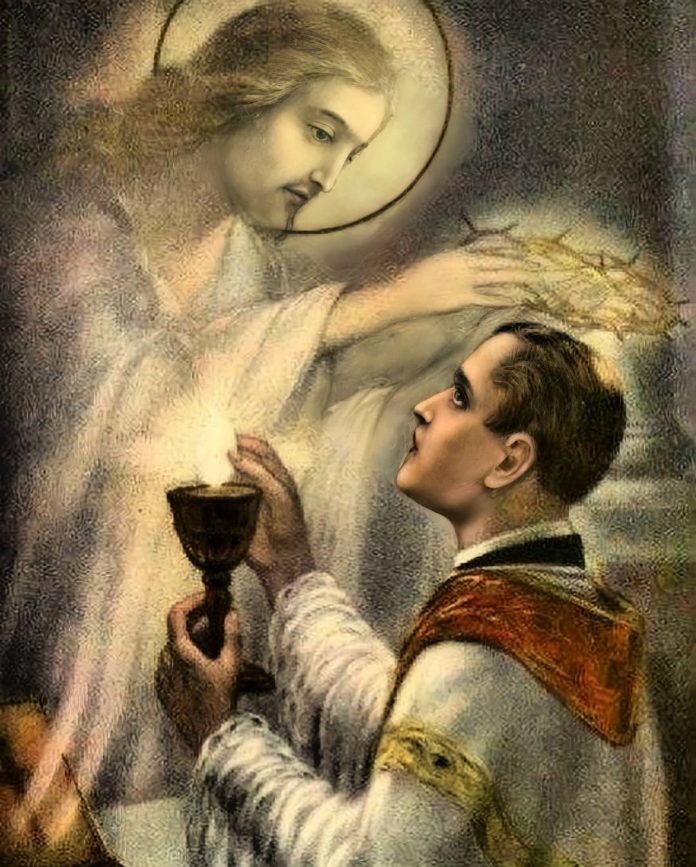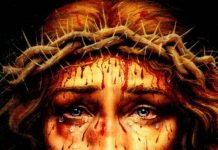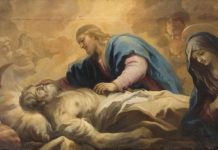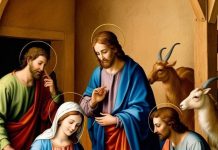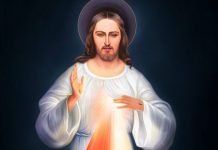Let us start with a reading from the Book of Sirach:
‘Like a star shining among the clouds, like the full moon at the holiday season;
Like the sun shining upon the temple, like the rainbow appearing in the cloudy sky;
Like the blossoms on the branches in springtime, like a lily on the banks of a stream;
Like the trees of Lebanon in summer, like the fire of incense at the sacrifice;
Like a vessel of beaten gold, studded with precious stones;
Like a luxuriant olive tree thick with fruit, like a cypress standing against the clouds;
Vested in his magnificent robes, and wearing his garments of splendor,
As he ascended the glorious altar and lent majesty to the court of the sanctuary’ (Sir 50:6-11).
These words of praise are written about Simeon son of Onias who was the high priest in his days. Priesthood is something that is valued very much not only here on earth but in heaven as well. In the Church, every priest partakes in the eternal priesthood of Jesus Christ, who is the high priest of the kingdom to come. At the close of his assignment on earth, Jesus gave the great commission to his disciples, that ‘they should go into all the world and proclaim the good news to the whole creation’. They were also given the power to cast out demons in his name and to cure the sick by laying their hands on them. They were also given power above all forces of evil.
At the Last Supper, during the institution of the Sacrament of Eucharist, Jesus told them to do it in remembrance of him, whenever they came together. Elsewhere we read that the disciples were also given the power to forgive sins. Jesus was grooming them to become priests like him and to serve the Father by emulating their Lord.
Priesthood is something so great that the secular society outside fails miserably to understand it. Out of ignorance they cast aspersions on priests. They are using the lens of this world to look at priests. But we know that priests are to be valued using a different matrix. We are sure to go wrong when we apply the same yardsticks used for earthly things to priestly ministries. We will definitely go wrong if we start comparing our parish priest with the gentleman living next door. Both of them are similar in their appearance and behavior. But they are different. As ordinary human beings, priests are also susceptible to anything to which we are exposed to. Their needs are similar to ours. As far as the world is concerned, there is nothing that distinguishes a priest from another person.
But they are different. Like Simeon the high priest they are decorated with the symbols of royal priesthood. The Bible testifies that priesthood is a gift from God. ‘And one does not presume to take this honor, but takes it only when called by God, just as Aaron was’ (Heb. 5:4). Catholic Church’s teachings are a mere reiteration of the already established truth about priesthood. ‘No one has a right to receive the sacrament of Holy Orders. Indeed no one claims this office for himself; he is called to it by God. Anyone who thinks he recognizes the signs of God’s call to the ordained ministry must humbly submit his desire to the authority of the Church, who has the responsibility and right to call someone to receive orders. Like every grace this sacrament can be received only as an unmerited gift ( CCC 1578).
Everything else in life depends on our decision and our choice. But priesthood is a call from God. Only when we distinguish priestly vocation from other vocations in this way, we will be able to appreciate our priests. Secular world could not and cannot grasp this difference. They think that priesthood is just another vocation like medicine, architecture, carpentry, teaching or business.
When a priest performs his priestly ministries, he is standing in the place of Christ. This is the source of his authority. Catechism of the Catholic Church summarises this exalted role of a priest in these words.
‘In the ecclesial service of the ordained minister, it is Christ himself who is present to his Church as Head of his Body, Shepherd of his flock, high priest of the redemptive sacrifice, Teacher of Truth. This is what the Church means by saying that the priest, by virtue of the sacrament of Holy Orders, acts in persona Christi Capitis: It is the same priest, Christ Jesus, whose sacred person his minister truly represents. Now the minister, by reason of the sacerdotal consecration which he has received, is truly made like the high priest and possesses the authority to act in the power and place of the person of Christ himself (virtute ac persona ipsius Christi). Christ is the source of all priesthood: the priest of the old law was a figure of Christ, and the priest of the new law acts in the person of Christ’ (CCC 1548).
If a priest is acting for and on behalf of Christ, two things follow. He should do all things that Christ would have done in the given circumstances and he should have all the power to act in the way expected of him. To put it briefly, he is not imitating Christ, but by donning the priestly robe of Christ he is acting as if Christ were present here and now.
Now imagine, what Jesus Christ would do when a sinner comes before him? Gospels give us examples of Jesus forgiving the sins of many. When the sick were brought to him, he healed them. When those possessed by demons were presented, he cast out evil spirits from them. When people needed guidance, he guided them. When they needed teaching, he taught them. When he met people he preached the gospel to them. When they deserved admonition, he never hesitated to admonish them. And finally when his time came, he offered his body and blood as the price for their salvation, this being the greatest sacrifice ever happened on earth.
A Priest, to be true to his name, should imitate Christ and do all these things. But as we know, man is weak by nature. We cannot find perfect persons who are ‘holy, blameless, undefiled, seperated from sinners and exalted above the heavens’ (Heb 7:26) so as to consecrate them as priests. Instead we select ordinary men with all weaknesses and shortcomings to be priests for Christ. At the time of consecration, he is given a share in Christ’s office that is granted once for all. The sacrament of Holy Orders confers an indelible spiritual character and cannot be repeated or conferred temporarily.
Whenever we think of a priest, the first thing that comes to our mind is the Holy Mass celebrated by him. Next comes Confession and other sacraments performed through him. Each Eucharsitic celebration is the reenactment of Christ’s sacrifice in Calvary. If the whole of humanity could be assured of salvation through this single act of sacrifice in cross, let every priest celebrating Holy Mass know that what he celebrates in the altar is also having the same value. It is such a noble, precious and sublime act which only a priest can do. ‘If we really understood the priest on earth, we would die: not of fear, but of love’, says St John Maria Vianney. St Padre Pio adds; “If men only appreciated the value of a holy Mass they would need traffic officers at church doors every day to keep the crowds in order.”
We will be able to carry out any work only when we are convinced about its efficacy and usefulness. Nothing is more irritating than doing something without employing our full concentration. If a priest does not get the real feeling of what a Holy Mass should give him, I would say, the major reason behind it is that he is not convinced about the great value of the great act being performed through his hands. St Ambrose says that from the first moment of receiving the Holy Orders, a priest ceases to be his own; he becomes God’s own.
St John Chrysostom emphasises the union of the celebrant with Christ by saying that the soul of the priest gets united with Jesus when he celebrates the Holy Mass. In Lawrence Justinian’s opinion every priest going to the altar to celebrate Holy Mass should know that he is doing so to intercede for all sinners. Its reflection can be seen in the words of Padre Pio when he said about Holy Mass; “I want to expiate the sins of all, like Jesus did on the cross.”
There are saints like Francis de Sales who used to get totally detached from this world the moment they entered the altar to celebrate Holy Mass.
O Priests, understand and appreciate the exalted position you are placed in. Accept with all humility, the higher responsibilities God has given you. Know that your flock looks at you for their spiritual nourishment. A Holy Mass, celebrated after due preparation and performed with devotion, uniting yourself with Jesus in his passion will benefit your people more than anything else. It is more efficient than a hundred homilies. Its value is infinite. Your first and foremost duty is to celebrate the mysteries of Jesus Christ, the eternal priest. Prepare yourself before it, celebrate it with due reverence, and give thanks to the Lord after it. When the people see a priest celebrating the Holy Mass in the right way, they also will be inspired to see the Eucharistic celebration as something to be esteemed.
We read that Jesus gave his disciples the authority to forgive sins. Through the uninterrupted apostolic lineage continuing till date, priests receive the authority to forgive sins. As far as a Christian is considered, Confession or the Sacrament of reconciliation is one of great value. If there are no priests, there cannot be confession. From our experience we know a simple way to distinguish good priests. They spend more time in the confessional. St John Maria Vianney is the best example. He used to spend most of his time in the confessional. Often it went up to sixteen hours. But for the prolonged hours he used to sit in the confessional, he was like any other priest. Yet there was something more interesting in the way he engaged in this sacred duty. It will be better to narrate it in his own words . Once he told his confreres; “I will tell you my recipe. I give sinners a small penance, and the rest I do in their place”. He used to keep vigils and fast to assist the expiation of the sins of the faithful. This act of charity towards a penitent is what makes a priest entitled to share in the glory of Christ. Because, Jesus himself did the penance for all sinners.
Many of us, I mean Catholics, are ignorant about the graces that flow from a good confession. It is the best medicine for a wounded soul. Ars, the little parish of John Vianney was rightly called ‘the great hospital of souls.’ When Holy Mass and Confession are becoming more and more difficult to access, we start feeling the heat. Those days are not too far, when we will frantically run to get a priest for confession. It is a wake up call, not to the priests, but to us who often deride our priests for no reason. We take pleasure in insulting, humiliating and mocking our priests. When one among them falls into temptations, we forget the remaining ninety nine who stand in faith and start equating every priest with the fallen one. Dear brothers and sisters, we are called to pray for our priests, not to judge them. Their judge is their Lord and do not forget that he is our judge too. If a priest stands, it is before his Lord and if he falls, it is also before his Lord. We have no business in what transpires between Jesus and his priests.
To get the maximum out of anything, preparation is a must. It is applicable to a priest’s ministries too. As mortals, they are weak and unworthy to celebrate the great mysteries entrusted to them. It is in the fitness of things that before entering the altar, priests should prepare themselves with prayer and meditation. Padre Pio used to say thirty rosaries before celebrating Holy Mass in the morning. Asked how he was getting time for it, he replied; “What else should I do at night”? This spirit of constant prayer is what differentiates a priest from others.
It is said that the life of a priest consists of three things. They are the preparation for Holy Mass, the celebration of the Mass and thanksgiving after its celebration. Once the Mass has ended, a priest is supposed to retire to his normal life thanking God until the time comes to start the preparations for his next Mass. St Alphonse Ligouri is straightforward in telling that a priest should not celebrate Mass unless he has a just idea about this great sacrament. During his earthly life, Jesus has not done anything greater than the institution of the Holy Mass, says the saint. The passion of Christ, crucifixion and resurrection are mystically symbolised in the Last Supper.
Celebrating the Holy Mass and hearing confessions are only part of the duties of a priest. When Jesus gave his disciples the great commission he also bestowed upon them power and authority over demons and all forces of evil. This is why the ministry of deliverance occupies an important place among the duties of a priest. Unfortunately many of us are unaware about this great authority gifted to our priests so that they would be able to ward off any kind of satanic influences from people. Admittedly, the number of priests practising exorcism or deliverance ministry are a few, though the Church encourages bishops to appoint at least one priest in their respective dioceses to attend to the deliverance ministry. This is a time when Satan engages in a direct battle with the people of God, unlike in the past when he was mostly operating from behind the curtain. As demonic attacks increase in number and gravity, so does the need to have priests well equipped to do the ministry of deliverance.
Casting out demons is no easy thing. We read in the gospel of Mark about a father who brought his son, who was possessed by a demon, to Jesus. Before that he had approached the disciples but they failed to cast the demon out. When the disciples asked Jesus why they couldn’t cast the evil spirit out, Jesus said to them, ” This kind can come out only through prayer”. Any priest venturing into the field of deliverance and exorcism, should be a man of prayer and fasting. Personal holiness is one thing the Holy Spirit values very much and it is in such persons that the gifts of the Spirit manifest the most. Let us hope and pray that more and more of our priests come forward to serve the Church in this ministry.
We have seen the examples of a number of priests who had done great things for the society, in various fields. While appreciating their zeal in giving testimony to Christ in whatever they do, we should not miss something more important. Priests are called to be separated from the rest. A life separate from everything mundane, though difficult, will give them ample time to be with Jesus in prayer. I am not saying that priests should not involve themselves in secular or social activities. But they should be prudent not to spend more time in such activities thereby causing their primary duty to be neglected.
A priest is not allowed to seek consolation from this world. His consolation comes from ‘Jesus Christ, who is crucified’. A priest is not allowed to seek pleasure from this world. His happiness is eternal and comes from the risen Lord. A priest is not to get appreciation in this world. His crown is reserved for the end. As Paul writes, ‘From now on there is reserved for me the crown of righteousness, which the Lord, the righteous judge, wil give me on that day, and not only to me but also to all who have longed for his appearance’ (2 Tim 4:8). A priest is running for the eternal crown, where he expects his flock also to be with him.
We are living in a time when priesthood is becoming more and more challenging. To stay afloat in a world that is rapidly sinking in the deluge of sin is not an enviable task. To withstand the tempest of temptations coming from all four sides is no easy task. To lead a life of prayer, penance and reparation among a people ‘weighed down with dissipation, drunkenness and worries of this life’ is truly challenging. To imitate Christ in a world that is drifting fast from him is the real challenge.
But we have thousands and thousands of priests who responded to the call of their Lord to serve him in love , charity and faith. They skip the rather easy path that most others tread, and instead carry their cross willingly and follow their Lord to the ultimate destination that is Calvary. Most of the time they are alone and forlorn. Occasionally a Simeon would come from Cyrene to help him carry the cross. Occasionally a Veronica will come with a soothing towel. They are but momentary reliefs; ultimate destination remains the same where the priest is to enact the sacrifice of Jesus Christ. Just like Jesus, he also does it for the whole world. He is nailed to the other side of Jesus’ cross that is always there welcoming anybody to embrace it. We often look at the crucified Christ, but fails to recognise that on the other side of the cross a priest is going through the passion and agony of Jesus, without we ever knowing it.
They need our prayers now more than ever. They need the intercession of the Queen of Priests now more than ever. She is inviting priests, whom she fondly calls ‘ beloved sons’, to a new and refreshing spiritual journey with her by consecrating them to her Immaculate Heart. This is her time and she is helping priests to be faithful and holy.
‘I make of you ministers of the Church-life, helping you to be faithful and holy priests. Be always available for the needs of souls, lend yourselves, with generous abnegation, to the ministry of reconciliation and be burning flames of love and of zeal for Jesus present in the Eucharist. In your churches may you once again hold frequent hours of public adoration and reparation to the most holy Sacrament of the altar’ ( Message 406 from ‘To the Priests, Our Lady’s Beloved Sons’).
Let us thank God for blessing us with holy and faithful priests. Let us pray for them. It is essential that true priests persevere till the last day. Jesus has revealed through Maria Valtorta that the days of Antichrist will be shorter if a sufficient number of true priests are there. ‘The more real priests are in the world when the times are fulfilled, the shorter and less cruel will be the time of the Antichrist and of the last convulsions of the human race’. The end of the world is also mystically linked to the presence of true priests. Maria Valtorta writes: ‘ The day there would no longer be in the world priests who are really priests, the world would end in a horror that words could not believe’.
The future of this world, and all of us living here, is linked to how many true priests, not just priests, remain there. We need priests shining like a star among the clouds, like the full moon at the holiday season, and like the sun shining upon the temple. Let them flourish like blossoms in springtime and like a lily on the banks of a stream. Like the trees of Lebanon in Summer let them give us shade and let the incense of their sacrifice permeate the world. May our priests be like olive trees thick with fruit and like cypress standing against the clouds.
It is time to raise our hands in supplication for the sanctification of our priests through the intercession of the Blessed Virgin. ‘ Queen of priests, pray for us’.
And finally to our beloved priests. Fear not, Jesus is with you. He called you not because you were great, but he knew how to make you great. He called you not because you can work miracles, but to use you as his instruments to work miracles. He chose you not because your voice is sweet and your words were of wisdom, but because he wanted to use your voice and your words to convey his message. With this confidence, let us sing for our priests:
‘I will be with you,
You will work miracles for me.
I will be with you,
Your words shall be my voice
I will be with you.
You are my son…’


